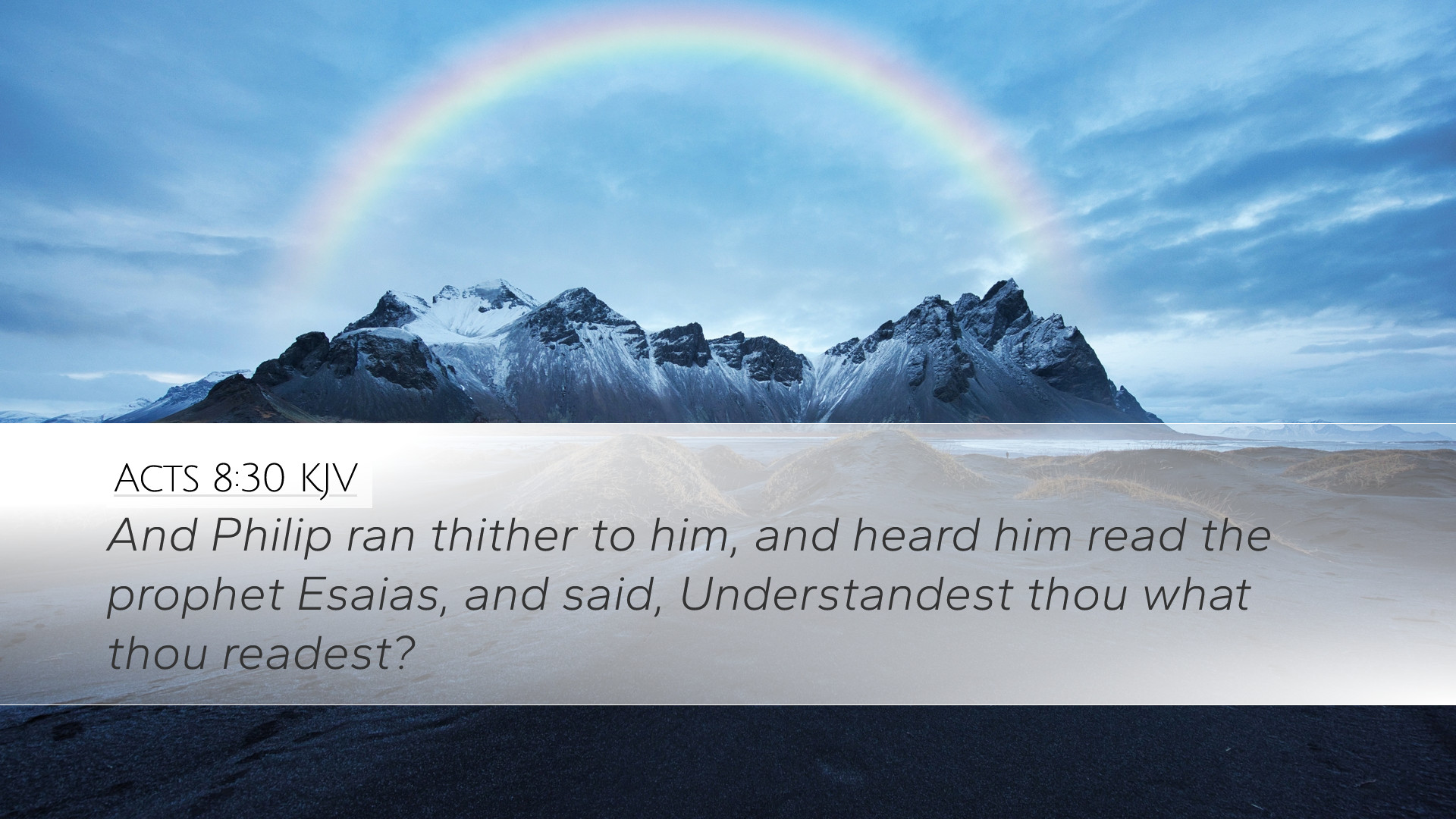Bible Commentary on Acts 8:30
Verse Context: Acts 8:30 reads: "And Philip ran thither to him, and heard him read the prophet Isaiah, and said, Understandest thou what thou readest?" This passage highlights an essential moment in the early church where the evangelism efforts led by Philip intersect with the spiritual thirst of the Ethiopian eunuch.
Analysis of Philip's Response
Importance of Immediate Action: Commentators like Matthew Henry emphasize Philip's readiness and zeal in responding to the divine prompting. His urgent action to "run" reveals a profound commitment to fulfilling God's mission. This exemplifies the urgency required in evangelism—where the soul's need for understanding must be met promptly.
Philip’s Methodology: Albert Barnes notes that Philip engages the Ethiopian eunuch in conversation, which illustrates a critical principle of evangelism: the necessity of dialogue. Philip's question, "Understandest thou what thou readest?" serves as a gentle invitation to explore the Scriptures, rather than a confrontation.
Spiritual Thirst and Understanding
The Search for Truth: The eunuch’s reading of Isaiah signifies a sincere quest for understanding profound spiritual truths. Adam Clarke remarks that the passage he was reading (Isaiah 53) speaks of suffering and redemption, indicating the eunuch's deep need for clarification on God's plan of salvation. This context deepens the discourse around how God's Word attracts sincere seekers.
Roles in Evangelism
Philip as a Model Evangelist: Philip serves as an exemplary figure in the model of evangelism. His attentiveness to the Holy Spirit's guidance and eagerness to share the gospel demonstrates how believers should respond to divine opportunities to witness. The commentaries highlight that effective ministry combines listening to the voids in others' understanding while concurrently providing scriptural clarity.
The Ethiopian Eunuch's Position
Significance of the Eunuch: The Ethiopian eunuch represents several groups within society—he was a foreigner, a high-ranking official, and a castrated man. Matthew Henry discusses how this diversity in social standing displays the universal call of the gospel, breaking societal barriers and reaching individuals outside the Jewish fold.
Eager to Understand: His response to Philip's inquiry highlights another critical element: the active role of the seeker. This eagerness to understand spiritual truths suggests a readiness to receive instruction. Albert Barnes elaborates on how these qualities of humility and openness are vital in one's journey toward faith.
Theological Implications
Understanding and Revelation: The question posed by Philip emphasizes the theological theme of divine revelation through Scripture. Adam Clarke makes the point that comprehension of biblical texts requires the illumination of the Holy Spirit. This reinforces the belief that intellectual understanding and spiritual enlightenment must coexist in the process of faith formation.
Application for Today’s Believers
Contemporary Evangelism: The principles derived from Acts 8:30 are ageless. Modern believers are called to emulate Philip’s approach—being attentive to the needs of those around them and diligently seeking the opportunity to share the hope found in the gospel. Matthew Henry underscores that every believer is an ambassador of Christ, and we must be equipped to answer inquiries about our faith effectively.
Listening as a Tool: Engaging others through open-ended questions mirrors Philip’s method and cultivates a space for spiritual dialogue. Albert Barnes encourages the church today to adopt these methods, suggesting that listening carefully to others' questions can open the door for meaningful conversations about faith.
Conclusion
In summary, Acts 8:30 captures a pivotal moment that reflects the essence of evangelism, emphasizing readiness, dialogue, and the importance of spiritual hunger. As pastors, theologians, and students grapple with this text, they should ponder how to embody these principles in contemporary ministry. The interplay of divine initiative and human response seen in this passage serves as a powerful template for mission work and personal witness.
Through the insights provided by public domain commentators, we can glean practical applications that encourage us to run toward opportunities to spread the gospel and engage with those who seek to understand the profound truths found within Scripture.


